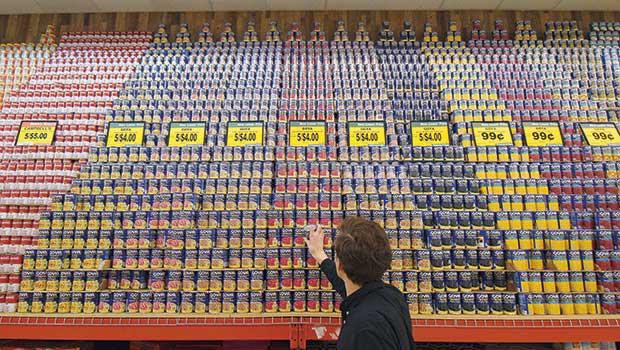Documentary tackles the topic of food waste
Anna Chai and Nari Kye co-directed ‘Wasted! The Story Of Food Waste’

Forty percent of the food produced in the United States goes to waste, more than 90 percent of wasted food in the U.S. ends up in landfills and the annual cost of food waste is $1 trillion, according to the documentary “Wasted! The Story of Food Waste.” And it’s not just an American problem — it is happening globally.

Author: COURTESY OF SUPER LTDMassimo Bottura is an Italian chef and restaurateur.
On the Web
For more information on the GlobeDocs Film Festival, the scheduled line-up and to purchase tickets, visit: www.filmfest.bostonglobe.com/film/
Food that ends up in landfills often doesn’t decompose properly. As a result, it releases methane into the atmosphere, a greenhouse gas that contributes to human-induced climate change.
Despite the bleakness of the statistics and the reality of what is occurring globally, “Wasted!” also offers some promising and realistic solutions, and the hope that food waste can be reduced on an individual and collective level.
Co-directors Anna Chai and Nari Kye set out to imbue a sense of optimism in their documentary about the issues of food loss and food waste. “We have seen all kinds of social documentaries, and while many of them are provocative and thought-provoking, we noticed a trend that a lot of them scared the pants off of you, really,” says Kye. “We wanted to offer solutions that as an individual you could feel like you’re doing something better. Anna and I were very focused on having a very solution-focused film that didn’t make you feel awful; that made you feel empowered as a consumer.”
The film project was aided by funding from The Rockefeller Foundation. In 2015, the United Nations announced a global goal to reduce food waste by 50 percent by 2030. In support of this goal, The Rockefeller Foundation launched its $130 million, seven-year YieldWise initiative designed to systemically address preventable food waste.
Zero Point Zero Films — the production company behind “Wasted!” as well as the Peabody Award-winning series “Anthony Bourdain: Parts Unknown” and the Emmy Award-winning series “The Mind Of A Chef” — approached The Rockefeller Foundation with the idea of making the “Wasted” documentary. With the Foundation’s support, production on the film began in August 2016 and was completed in March of this year, in time to premiere at the 2017 Tribeca Film Festival. “It was great that we had sort of an aligned purpose, and with The Rockefeller Foundation we were able to make this film,” says Chai.
Narrated and executive-produced by chef and author Anthony Bourdain, “Wasted” screens on Thursday, Oct. 12 at the Kendall Square Cinema at 7 p.m. as part of this year’s GlobeDocs Film Festival. The film features several internationally renowned chefs, including Dan Barber, Mario Batali and Danny Bowien, who discuss the farm-to-table movement, food insecurity and how they avoid food waste.
Italian chef Massimo Bottura, interviewed in the film, states that 1.3 billion tons of food is wasted every year. “We need to act differently,” he says. And even Bourdain, who states in the beginning of the film that he doesn’t like the idea of being an advocate, says the food principle that was drilled into him as a cook coming up in the culinary world, was to “use everything, waste nothing.”
Directors Chai and Kye, who have worked together for a long time and have worked with a lot of chefs over the years, both say that one of the things they’ve learned about chefs is they abhor food waste. “They truly and utterly hate wasting food,” says Chai. “It’s both a sign of lack of creativity and a waste of resources. It’s literally money going into the trash that could be transformed into a meal, even if it’s feeding the staff.”
One of the ways that the film aims to empower viewers is by offering practical tips, such as shopping and eating mindfully as a first step in reducing food waste in our daily lives. “If everyone did one thing every day, it would make a huge dent in it,” says Chai. “I think that’s an exciting part of a problem like food waste — small changes can actually have great impact.”
In Boston’s Dorchester neighborhood, the Daily Table, a not-for-profit grocery store, also hopes to provide a solution to food waste while addressing food insecurity. The mission of the retail store is to help communities make great choices around food by making it easy for them to choose tasty, healthy, convenient and truly affordable meals and groceries, according to its website.
Doug Rauch, former president of Trader Joe’s and founder of Daily Table, who has worked in the food industry for 35 years, says in the documentary that he is keenly aware that “throughout the system, top-to-bottom, there’s a lot of food being wasted.” He notes that one in six Americans is ‘food insecure,’ and knowing this, the concept behind Daily Table is really simple. It’s “What can we do to try to use one problem to solve the other problem?” says Rauch.
Kye notes that another way to combat food waste is to create awareness through word-of-mouth and social media. “The more that people know about this issue and spread the word of how detrimental food waste can be for their lives and the environment, [the more] it will stick with you and it will, I think, create behavioral change,” she says.
One of the simplest tips that both filmmakers would like audiences to take away from the film is to purchase less food, to value it and to think about who grew it and where it comes from — in short, to become a conscious consumer.






